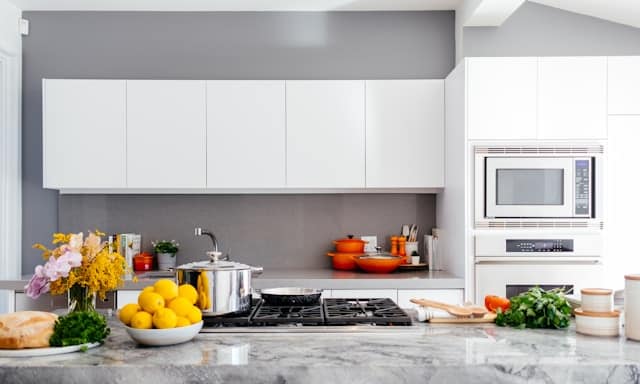How to Choose the Perfect Sustainable Material for Kitchen Countertops?

When it comes to kitchen design, countertops are a critical component. They serve as the focal point, both functionally and aesthetically, in your kitchen. The countertop you choose can dramatically impact the look and feel of your space. However, these surfaces should not only be beautiful and durable but also eco-friendly. Adopting sustainable choices in our homes is now more important than ever. Let’s explore some of the most eco-friendly materials for kitchen countertops and how to choose the perfect one for your home.
Scrutinizing the Sustainability of Common Countertop Materials
When you think of countertops, materials like granite, marble, or quartz might come to mind. These are the staples of kitchen design, chosen for their stunning visuals and robust nature. However, how do these popular choices fare on the sustainability scale?
Sujet a lire : What’s the Best Way to Create a Discrete Gaming Station in a Family Room?
Granite, a natural stone, is extremely durable, meaning it will last for decades without needing replacement. However, its extraction process can be environmentally damaging, causing habitat destruction and pollution.
Marble shares similar issues with granite. It’s a natural, long-lasting material, but its quarrying and transportation contribute significantly to carbon emissions.
Dans le meme genre : How to Design a Space-Saving Guest Sleeping Loft in a High-Ceiling Home?
Quartz, a man-made stone, is a popular choice for its durability and variety of designs. But its manufacturing process involves high energy consumption and releases considerable CO2 into the atmosphere.
Therefore, while these materials can be sustainable in terms of longevity, their production processes might not be as eco-friendly.
Exploring Eco-friendly Alternatives to Traditional Countertop Materials
Fortunately, advancements in design and technology have given rise to several sustainable alternatives to traditional countertop materials. These alternatives not only lessen the environmental impact but also offer unique aesthetics to your kitchen.
Recycled glass countertops are becoming increasingly popular. They are made from up to 85% post-consumer glass, diverted from landfills. The manufacturing process is less energy-intensive compared to other materials, and the final product is highly durable and easy to maintain.
Wood countertops, especially those made from reclaimed or salvaged wood, are another excellent sustainable choice. Wood provides a warm, natural aesthetic and can last a long time if properly maintained.
Paper composite countertops, made from recycled paper and a resin binder, are surprisingly durable and stain-resistant. They give a unique, warm, and organic look to the kitchen.
The Role of Sustainability in Bathroom Countertops
While kitchen countertops often garner a lot of attention, let’s not forget about the bathroom. Bathroom countertops also play a significant role in a home’s overall sustainability.
Many of the materials discussed for kitchen countertops, such as recycled glass and wood, can also be used in the bathroom. However, be sure to consider the unique demands of a bathroom environment. It’s essential to choose a material that can withstand water and humidity.
How to Choose the Perfect Sustainable Countertop Material?
The selection of the right sustainable countertop material for your kitchen or bathroom depends on several factors.
Design should be a top consideration. The countertop should match the aesthetic of your kitchen or bathroom. For instance, if you have a modern kitchen design, the sleek, colorful look of recycled glass might be a great fit.
Durability is another crucial factor. The kitchen and bathroom are high-traffic areas of the home, so the material should be able to withstand heavy use. Both recycled glass and paper composite are excellent choices in this regard.
Finally, consider the maintenance needs of the material. Some materials, like wood, require more care to keep them looking their best.
The Future of Sustainable Countertops
Sustainability is a critical aspect of our future, and the design industry is no exception. The future of sustainable countertops looks promising, with continuous advancements in eco-friendly materials.
The trend is moving towards materials with low environmental impact, both in their production and throughout their lifecycle. Recycled materials are gaining popularity, and innovative new options like bio-glass and recycled metal are emerging.
Also, manufacturers are increasingly focusing on reducing their carbon footprint by optimizing production processes and prioritizing local sourcing.
Remember, the countertop choice that you make impacts not just the aesthetics of your home, but also the environment. Be mindful and choose a material that’s not just beautiful and durable, but also gentle on our planet.
Delving Deeper into Sustainable Countertop Options
Sustainability is much more than just a trend; it’s a necessity. Given our current environmental challenges, it’s crucial to consider sustainable materials when planning a kitchen or bathroom renovation. Besides recycled glass, wood, and paper composite, several other eco-friendly countertop materials warrant consideration.
Stainless steel countertops are a viable eco-friendly option. Not only do they provide a clean, modern look to any kitchen or bathroom, but they are also made from a significant percentage of recycled materials. Additionally, at the end of its lifespan, stainless steel is 100% recyclable, making it a truly sustainable choice.
Another option to consider is solid surface countertops made from acrylic or polyester. This material is durable, heat resistant, and easy to clean. While these countertops are not made from recycled materials, they are very long-lasting and entirely recyclable, adding to their eco-friendliness.
Concrete countertops, created from natural materials, are also gaining popularity in green kitchen designs. They are incredibly durable and can be customized to your exact aesthetic preferences. However, they do require sealing to prevent stains and water damage.
Finally, butcher block countertops bring warmth and richness to your kitchen. Made from offcuts of hardwood, these countertops are a great way to repurpose and recycle wood. They are also easy to refinish and repair, extending their lifespan significantly.
Making Your Green Kitchen Dream a Reality
Choosing the perfect sustainable material for your kitchen countertops is not just about aesthetics and durability. It’s about creating a space that aligns with your values and contributes positively to the environment.
The key to making the right choice is doing your homework. Understand the pros and cons of each material, and assess them against your needs, lifestyle, and budget. Remember, no material is perfect, but some options are clearly more sustainable than others.
Consider your local climate and how it might impact the performance and longevity of the countertop material. For example, butcher block countertops might not be the best choice if you live in a hot, humid climate, as they can warp over time.
Besides the countertop material itself, consider the eco-friendliness of the installation process. Opt for local suppliers to reduce transportation emissions, and consider contractors who follow green practices.
Choosing a sustainable countertop material is a significant step towards creating a green kitchen. But it doesn’t stop there. Consider other aspects like energy-efficient appliances, LED lighting, low VOC paints, and more, to make your kitchen truly eco-friendly.
Remember, the path to sustainability is not a sprint but a marathon. Every small step counts towards reducing our environmental footprint and building a greener future. Whether it’s opting for a recycled glass countertop or a natural stone one, your choices make a difference. Be conscious, be mindful, and most importantly, be committed to making our planet a better place. Your dream green kitchen is not just a renovation project; it’s a statement of your commitment to sustainability.
